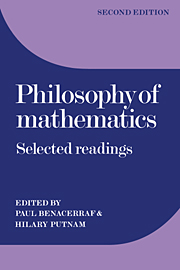Book contents
- Frontmatter
- Contents
- Preface to the second edition
- Introduction
- Part I The foundations of mathematics
- Symposium on the foundations of mathematics
- Disputation
- Intuitionism and formalism
- Consciousness, philosophy, and mathematics
- The philosophical basis of intuitionistic logic
- The concept of number
- Selections from Introduction to Mathematical Philosophy
- On the infinite
- Remarks on the definition and nature of mathematics
- Hilbert's programme
- Part II The existence of mathematical objects
- Part III Mathematical truth
- Part IV The concept of set
- Bibliography
The philosophical basis of intuitionistic logic
Published online by Cambridge University Press: 05 June 2012
- Frontmatter
- Contents
- Preface to the second edition
- Introduction
- Part I The foundations of mathematics
- Symposium on the foundations of mathematics
- Disputation
- Intuitionism and formalism
- Consciousness, philosophy, and mathematics
- The philosophical basis of intuitionistic logic
- The concept of number
- Selections from Introduction to Mathematical Philosophy
- On the infinite
- Remarks on the definition and nature of mathematics
- Hilbert's programme
- Part II The existence of mathematical objects
- Part III Mathematical truth
- Part IV The concept of set
- Bibliography
Summary
The question with which I am here concerned is: What plausible rationale can there be for repudiating, within mathematical reasoning, the canons of classical logic in favour of those of intuitionistic logic? I am, thus, not concerned with justifications of intuitionistic mathematics from an eclectic point of view, that is, from one which would admit intuitionistic mathematics as a legitimate and interesting form of mathematics alongside classical mathematics: I am concerned only with the standpoint of the intuitionists themselves, namely that classical mathematics employs forms of reasoning which are not valid on any legitimate way of construing mathematical statements (save, occasionally, by accident, as it were, under a quite unintended reinterpretation). Nor am I concerned with exegesis of the writings of Brouwer or of Heyting: the question is what forms of justification of intuitionistic mathematics will stand up, not what particular writers, however eminent, had in mind. And, finally, I am concerned only with the most fundamental feature of intuitionistic mathematics, its underlying logic, and not with the other respects (such as the theory of free choice sequences) in which it differs from classical mathematics. It will therefore be possible to conduct the discussion wholly at the level of elementary number theory. Since we are, in effect, solely concerned with the logical constants – with the sentential operators and the first-order quantifiers – our interest lies only with the most general features of the notion of a mathematical construction, although it will be seen that we need to consider these in a somewhat delicate way.
- Type
- Chapter
- Information
- Philosophy of MathematicsSelected Readings, pp. 97 - 129Publisher: Cambridge University PressPrint publication year: 1984
- 10
- Cited by

